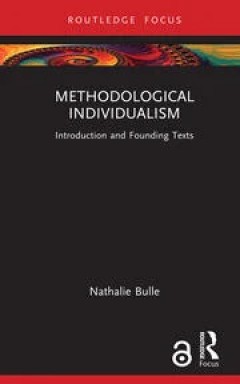Filter by

Doing Feminist Urban Research: Insights from the GenUrb Project
Doing Feminist Urban Research introduces the reader to the newly emerging 21st-century global landscape of feminist urban research. It showcases decolonising practices, partnerships and teamwork, new standards such as EDI, geo-ethnographic methodologies, software-enhanced qualitative data analysis, and knowledge mobilisation. This book delves into both the institutional and lived realities of …
- Edition
- -
- ISBN/ISSN
- 9781032668727
- Collation
- -
- Series Title
- -
- Call Number
- -

Transformations in Social Science Research Methods during the COVID-19 Pandemic
This volume explores how researchers made innovative use of online technologies to innovate, define, and transform research methodologies in light of the varying impacts of the COVID-19 pandemic, especially those related to the ability to conduct qualitative research. The onset of the COVID-19 pandemic resulted in a radical shift in the way that people all over the world were/have been able to…
- Edition
- -
- ISBN/ISSN
- 9781032646824
- Collation
- -
- Series Title
- -
- Call Number
- -

Delivering Effective Adventure Therapy: A Therapist’s Guide to Producing Tr…
Delivering Effective Adventure Therapy: A Therapist’s Guide to Producing Transformative Change for Clients provides effective interventions for enriching therapeutic techniques using experiential methodology infused with metaphor. Therapists continuously search for effective therapeutic interventions to engage clients in treatment and promote positive change. Adventure therapy overcomes the …
- Edition
- -
- ISBN/ISSN
- 9781032640303
- Collation
- -
- Series Title
- -
- Call Number
- -

Methodological Individualism: Introduction and Founding Texts
Originating in the late 19th century and becoming the subject of ongoing methodological debates in the social sciences, methodological individualism is a paradigm that focuses on understanding social phenomena through the actions and choices of individuals rather than through collective explanations. This book highlights its theoretical bases as defined and developed in the writings of its foun…
- Edition
- -
- ISBN/ISSN
- 9781032627021
- Collation
- -
- Series Title
- -
- Call Number
- -

Empowering marginalised women in remote Indian villages :an impact study
Saikia, Chalmers, Michael and Orrell explore the impact of social education on gender inequalities in rural Tamil Nadu where highland women’s lives are damaged by discrimination, marginalisation and deprivation. Social education refers to agent-oriented learning experiences focused on power relations designed to help oppressed people regain their humanity in the struggle for empowerment. The…
- Edition
- -
- ISBN/ISSN
- 9781003519409
- Collation
- -
- Series Title
- -
- Call Number
- -

Rethinking the Concept of Waste and Mass Consumption: Preserving Resources th…
This book presents hard facts, drawn from extensive research, to highlight our unsustainable consumption of the Earth’s resources and the limitations of the UK’s current management of waste and recycling. Setting out a bleak picture of a world in which we are literally consuming our planet, the book explores the psychological, economic and capitalist drivers behind this behaviour. Controve…
- Edition
- -
- ISBN/ISSN
- 9781003504757
- Collation
- -
- Series Title
- -
- Call Number
- -

India Migration Report 2024: Indians in Canada
India Migration Report 2024: Indians in Canada is one of the first volumes to comprehensively examine and analyse the different facets of Indian migration to Canada. This volume: • Examines the comprehensive history of Indian migration to Canada, including the story of social, cultural, economic, and political integration, analysis of socio-economic characteristics, and evolving political s…
- Edition
- -
- ISBN/ISSN
- 9781003499787
- Collation
- -
- Series Title
- -
- Call Number
- -

India Migration Report 2023: Student Migration
The India Migration Report 2023: Student Migration is one of the first books that attempts to comprehensively explore the various nuances of Indian international student migration factoring in multiple factors that influence the migration journey of Indian students. It also looks into other migration stories including internal and international returnees, various impacts of remittances, and mig…
- Edition
- -
- ISBN/ISSN
- 9781003490234
- Collation
- -
- Series Title
- -
- Call Number
- -

Organic Chemistry: Structure, Function, and Practice
With a focus on organic chemistry students at all levels, problems are incorporated into the body of the text in an effort to engage students more directly in chemistry. Arrowless mechanisms seek to help students develop their electron-pushing skills and intuition through repeated practice. By design this volume is more actively engaging than a traditional textbook. In addition, the historical …
- Edition
- -
- ISBN/ISSN
- 9781003479352
- Collation
- -
- Series Title
- -
- Call Number
- -

Chemistry: Energy, Matter, and Change
Providing a holistic overview of general chemistry and its foundational principles, this textbook is an essential accompaniment to students entering the field. It is designed with the reader in mind, presenting the historical development of ideas to frame and center new concepts as well as providing primary and summative sources for all topics covered. These sources help to provide definitive i…
- Edition
- -
- ISBN/ISSN
- 9781003479338
- Collation
- -
- Series Title
- -
- Call Number
- -
 Computer Science, Information & General Works
Computer Science, Information & General Works  Philosophy & Psychology
Philosophy & Psychology  Religion
Religion  Social Sciences
Social Sciences  Language
Language  Pure Science
Pure Science  Applied Sciences
Applied Sciences  Art & Recreation
Art & Recreation  Literature
Literature  History & Geography
History & Geography